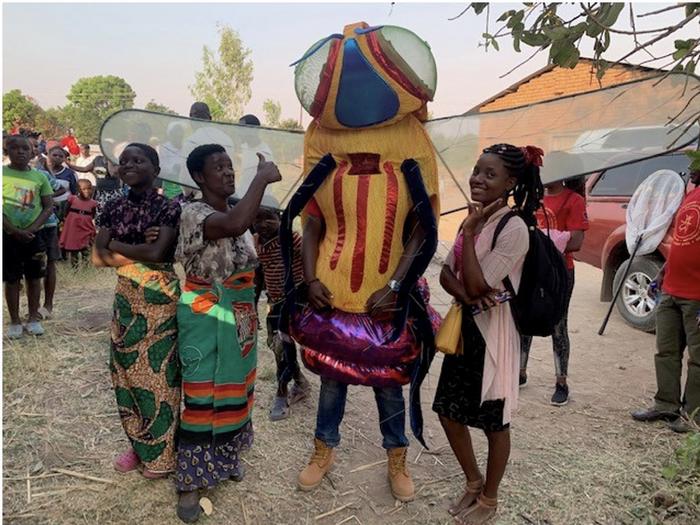“Parasite Street Science” is a recent public engagement project by Dr Nicola Veitch and a team of scientists of the University of Glasgow that uses exciting street theatre performances to educate and entertain audiences in the UK and Malawi on the subject of African Sleeping Sickness.

Credit: Nicola Veitch
“Parasite Street Science” is a recent public engagement project by Dr Nicola Veitch and a team of scientists of the University of Glasgow that uses exciting street theatre performances to educate and entertain audiences in the UK and Malawi on the subject of African Sleeping Sickness.
This project brought together scientists from Scotland and Malawi to develop a new interactive educational performance about African Sleeping Sickness. Other collaborators included district health officers, Outdoor street theatre organisationsand community members affected by the disease.
“I have been watching outdoor street theatre in Glasgow for many years and was inspired during a performance that had a medical theme and a strong health message,” says Dr Veitch. “In Malawi, outdoor performance is used for health messaging, as there is limited infrastructure to support the use of digital resources.”
Sleeping Sickness is a neglected tropical disease and a significant health issue in rural Africa. It is most prevalent in resource poor settings often far from healthcare facilities and initial presentation is similar to malaria. As a result, many cases go undiagnosed or present late in infection.
A lack of trust in scientists and healthcare professionals, alongside limited opportunity to readily access to healthcare has often resulted in diagnosis and treatment not being sought. “Parasite Street Science provides an innovative model for public engagement around African Sleeping Sickness and aimed to enhance the trust in scientists and public health professionals within affected communities in Malawi,” says Dr Veitch.
The performance was first piloted at Partick Thistle Football Club’s Firhill Stadium with four collaborators from Malawi, students from the University of Glasgow and the Outdoor Arts organisation Surge. A post-performance survey found that 90% of the football fans enjoyed the show.
The project then took place in two areas in rural Malawian villages surrounding the wildlife reserves of Vwaza and Nkhotakota in which sleeping sickness has recently been diagnosed. A total of six performances took place, with events typically attracting approximately 1000 people each time. There was an active Q&A following the performance, where audience members asked scientists questions relating to African Sleeping Sickness.
A typical performance includes performers dressed as scientists catching “infectious” beach balls transmitted by a giant tsetse fly, using large “antibody nets”. The crowd act as a giant bloodstream wearing red shirts and hats.
Feedback showed that 97% of audiences enjoyed the performance and 92% said that they were keen to learn more about the science of African Sleeping Sickness. Local community members said: “It is amazing to have survivors able to participate in this project and raise awareness aboutprevention.”
The street theatre resources will remain in Malawi for ongoing use by the Public Health Office and Dr Veitch and the project team have now secured funding to build on the success of the tour with the addition of digital content to share in community cinemas throughout other areas of Malawi.
Dr Veitch is part of the Society for Experimental Biology’s Outreach, Education and Diversity SEB group, which addresses how science is communicated to the public and how to improve the inclusivity of scientific research.




